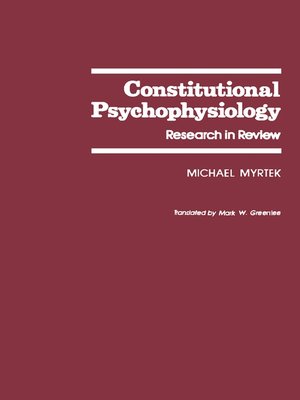
Sign up to save your library
With an OverDrive account, you can save your favorite libraries for at-a-glance information about availability. Find out more about OverDrive accounts.
Find this title in Libby, the library reading app by OverDrive.



Search for a digital library with this title
Title found at these libraries:
| Loading... |
Constitutional Psychophysiology: Research in Review is based on the findings of a research project conducted by the psychophysiology research team at the Psychological Institute of the University of Freiburg, West Germany. This book is organized into four parts encompassing 21 chapters that summarize the numerous psychological, physiological, biochemical, and anthropometric measurements in extensive multivariate investigations of large student and cardiocirculatory patient samples. Part I describes first the heredity of morphological, physiological, and psychological characteristics, along with the concepts emphasizing morphological aspects, factor-analytic studies, and single aspects of the body build. This part also discusses the psychomorphological relationships; the relationships between biochemical findings and personality characteristics; the sympathicotonia-vagotonia concept; and the empirical studies on autonomic lability. Part II presents the physiological methods applied in the study, such as blood pressure measurement, physical circulatory analysis, and impedance cardiography. This part also considers the selection of criteria used for data collection, including validity, representativeness, reliability, stability, and objectivity. Part III explores the correlative procedures and classificatory methods. This part specifically tackles the common factor analyses of psychological and physiological variables and the issue of psychophysiological response specificity, which is important for psychosomatic medicine. Part IV discusses the most important conclusions of the study, demonstrating the lack of psychophysiological correlations and the nullity of psychophysiological covariance hypothesis. This book is of great value to research workers and graduate students in the fields of psychophysiology, genetic psychology, personality, and differential psychology, as well as psychosomatic medicine.






